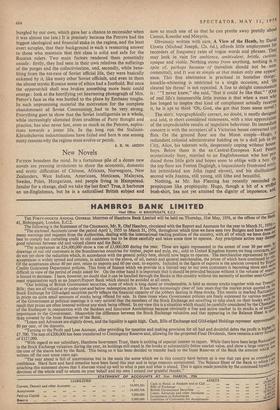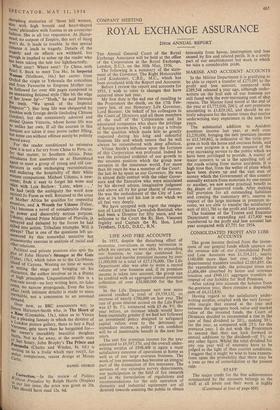New Novels
FICTION broadens the mind. In a fortuitous pile of a dozen new novels are pressing invitations to share the economic, domestic and erotic difficulties of Chinese, Africans, Norwegians, New Zealanders, West Indians, Americans, Mexicans, Malayans, Swedes, Poles, Hungarians, and people living in Hampstead. Insular for a change, shall we take the last first? True, it harbours an un-Englishman, but he is a naturalised British subject and
now so much one of us that he can prattle away prettily about Camus, Koestler and Moravia.
Obviously written with care, A View of the Heath, by David Unwin (Michael Joseph, 12s. 6d.), affords little employment for recorders of frequency rates of vogue words and phrases. They may look in vain for ambience, ambivalent, brittle, curious, opaque and viable. Nothing stems from anything, nothing is 01 spite of, perhaps because of (novelists should not be non' committal), and It was as simple as that makes only one appear' ance. This fine abstinence is practised in homelier things: knuckle-whitening is restricted to a single occasion, and cleared his throat' is not repeated. A line to delight connoisseurs is : "I never knew," she said, "that it could be like that." ' (One of real life's innumerable little ironies is that when a man who has longed to inspire that kind of compliment actually receives it, he is apt to think 'Oh, God, she got that from some novel.) The story, topographically correct, no doubt, is neatly designed and told, in short considered statements, with a nice appreciation of the unpredictable results of impulsive behaviour. Its immediate concern is with the occupiers of a Victorian house converted lutd flats. On the ground floor are the Moon couple—Hugo, a redundant colonial administrator holding on to a dull job in the City, Alice, his tolerant wife, desperately coping without house' boys. Below them is the ex-Central-European Karl Peters, mysteriously busy, married to an Englishwoman who has pro' duced three little girls and hopes soon to oblige with a boy. 9 the top floor are Fenton Dagleigh, a loquaciously frustrated artist' d his intimidated son John (aged eleven), and his disillusioned second wife Joanna, still young, still lithe and beautiful. Nothing, as Mr. Ian Fleming has recently reminded 11,s' propinques like propinquity. Hugo, though a bit of a stuffed bush-shirt, has not yet attained the dignity of impotence, and' .00 SPECTATOR, MAY 11, 1956 cheriphing memories of 'those hill women, shin with high breasts and heart-shaped faces,' philanders with Joanna in an avuncular fashion. She is all too responsive. At Hamp- stead, no outpost of Empire, this sort of thing won't do. It leads to trouble. In this special instance it leads to tragedy. Details of the tragedy and its effects are withheld, but
has is implied to sober up the reader who nas been taking the tale too lightheartedly.
What next? Where next? To China with Pearl S. Buck to meet Tzu Hsi. In Imperial Orchid (Methuen, 16s.) her career from "'chid the virgin to Yehonala the concubine and from Favourite to Empress Mother can be followed for over 400 pages composed in an unexacting fictional style (`She bit the edge of her lower lip'—' "Hush," he said between 11,4 teeth. "We speak of the Imperial nrnperor" '). Her long life was chequered by troubles with foreign devils (including Chinese Gordon), but she consistently admired and envied Queen Victoria, whose home life was so unlike her own. If all the courses in this banquet are taken it may prove rather filling, but some can without offence surely be politely Waved away. For the reader conditioned to extensive view it is not a far cry from China to Peru, or, for that matter, to Southern Africa. peter Abrahams first assembles us at Hampstead again to meet a group of young and old con- spirators in exile exchanging recriminations and enduring the hospitality of their white women companions. Michael Udomo, a new- comer, finds it easy to forget his woes and relax with Lois Barlow: 'Later, when . . s1.16 had (with the ambiguity the word now ,„ 7,rries) Jo Furse as well. Returned to the arms Mother Africa he qualifies for respectful attention, and A Wreath for Udomo (Faber, ,,155.) becomes a novel of considerable drama- tic Power and discernibly serious purpose. r10Ino, elected Prime Minister of Pluralia, is etrayed and defeated by the forces he had called into action. Tribalism triumphs. Will it always? That is one of the questions left un- answered by this somewhat tentative but Praiseworthy exercise in analysis of racial and other relations. Political and private passions also spin the plot of John Hearne's Stranger at the Gate (Faber, 15s.), which takes us to the Caribbean island of Cayuna. Wasting no time or words In setting the stage and bringing on his characters, the author involves us in a drama (2f. high principles. Unquestionably this is a first--rat novel—no lazy writing here, no false %nes. no narrow propaganda. Even the love Itnair (with intimate details) is made to seem ,Iiievitahle, not a concession to an assumed .ernand. „Over now, as BBC announcers say, to Harcourt-Smith who, in The Heart of funaose (Constable, 15s.), takes us to Venice 4-r a Pleasing fantasy in which the director of „'-ondon picture gallery, there to buy a Paul pronese, gets more than he bargained f or- Llse owner's incredibly beautiful daughter oft3tta. Not so far away, at the seaside state p San Soucy, John Brophy's The Prince and inetronella (Chatto and Windus, 8s. 6d.) is vciting us to a frolic which may recall, for unfair comparison, recent doings at Monte
DANIEL GEORGE



































 Previous page
Previous page